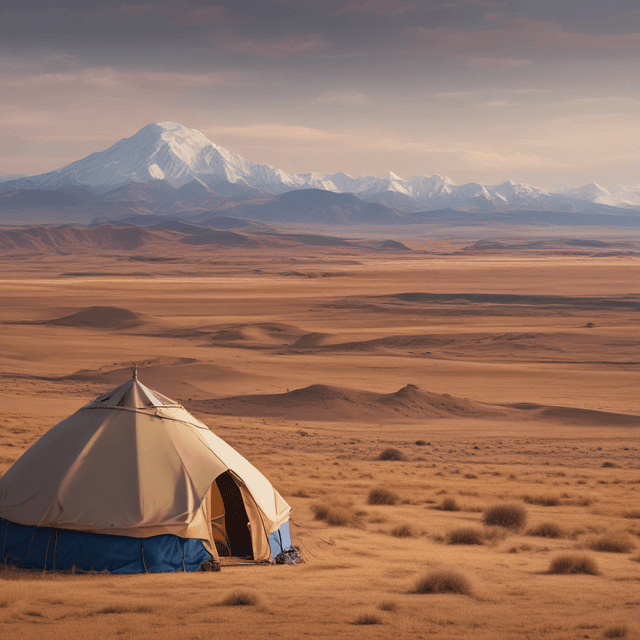
| Area | 2,724,900 km² |
| Region | Central Asia |
| Capital | |
| Country | |
| Currency | |
| President | |
| Government | Unitary presidential republic |
| Population | 18,806,296 (2023 est.) |
| Independence | From the Soviet Union on 16 December 1991 |
| Largest City | |
| Prime Minister | |
| Dominant Religion | |
| Notable Achievements | Largest landlocked country in the world • Leading producer of rare earth minerals • Successful space program |
The Republic of Kazakhstan is a vast, landlocked country located in Central Asia. Spanning an area of over 2.7 million square kilometers, it is the largest landlocked country in the world and the ninth-largest country overall. Kazakhstan borders Russia to the north, China to the east, Kyrgyzstan, Uzbekistan and Turkmenistan to the south, and the Caspian Sea to the west.
The origins of the Kazakhstani people can be traced back to the 15th century with the establishment of the Kazakh Khanate, a nomadic Turkic confederation that emerged from the collapse of the Golden Horde. Over the centuries, the Kazakhs gradually expanded their territory across the Eurasian Steppe, coming into increasing contact and conflict with the expanding Russian Empire in the 18th and 19th centuries.
In the late 19th century, much of the Kazakh homeland was incorporated into the Russian Empire as an autonomous province. While this limited the Kazakhs' full self-governance, they were able to maintain a significant degree of cultural and linguistic autonomy within the imperial system, with the Russian Tsar recognizing the Kazakh Khans as the traditional nobility.
During the Soviet era, Kazakhstan was established as the Kazakh Soviet Socialist Republic, one of the constituent republics of the USSR. Unlike some other Soviet republics, Kazakhstan was able to retain a higher degree of regional autonomy and influence within the centralized Communist system. This allowed the Kazakhs to experience a renaissance of cultural activity, with the development of a distinct national language, literature, and arts.
In 1991, following the dissolution of the Soviet Union, Kazakhstan declared its independence and transitioned to a secular, democratic republic. Since then, the country has played an increasingly prominent role in Central Asian affairs and the global economy, particularly in the energy and mineral sectors.
Kazakhstan is situated in the heart of the Eurasian continent, spanning a diverse range of landscapes from the snow-capped peaks of the Tian Shan mountains in the southeast to the vast, arid steppes of the north. The country is home to several major rivers, including the Irtysh, Ural, and Syr Darya, as well as the endorheic Caspian Sea along its western border.
The climate of Kazakhstan varies considerably by region, ranging from continental in the north to subtropical in the south. Winters can be bitterly cold, with temperatures plummeting well below freezing, while summers are generally hot and dry. The country's diverse geography and climate have resulted in a rich array of flora and fauna, including endemic species like the Przewalski's horse and the Siberian tiger.
With a population of over 18 million, Kazakhstan is the most populous country in Central Asia. The Kazakhs make up the largest ethnic group, accounting for around 65% of the total population. Other significant minority groups include Russians, Uzbeks, Uighurs, Tatars, and Ukrainians.
Kazakhstani culture is a vibrant blend of Turkic, Persian, Russian, and Chinese influences, reflecting the country's strategic location along historic trade routes like the Silk Road. Traditional Kazakh culture is heavily influenced by the nomadic pastoralist lifestyle, with iconic symbols like the dombra lute, golden eagles, and the vast open landscapes of the Eurasian Steppe.
The majority of Kazakhstanis follow Islam, though there are also significant Eastern Orthodox, Protestant, and Jewish communities. The country's diverse religious and ethnic makeup is celebrated through numerous cultural festivals, events, and traditional customs.
Kazakhstan has emerged as a regional economic powerhouse, leveraging its vast natural resources and strategic location to fuel rapid development in the post-Soviet era. The country is a major producer and exporter of oil, natural gas, coal, uranium, and a wide range of rare earth elements essential for modern technology.
In addition to its energy and mineral wealth, Kazakhstan has also developed strong agricultural, manufacturing, and service sectors. The country's vast stretches of fertile land make it a significant producer of crops like wheat, corn, and cotton. Kazakhstan's transportation and logistics infrastructure, centered around the major city of Almaty, also play a crucial role in regional and global trade.
The Kazakhstani government has made concerted efforts to diversify the economy and attract foreign investment, particularly in the technology and innovation sectors. The country's ambitious Kazakhstani space program has achieved notable successes, including the development of its own domestic satellite technology.
As a newly independent state, Kazakhstan has sought to balance its relations with its larger neighbors, Russia and China, as well as cultivate ties with the West. The country has emerged as a leading power in Central Asia, hosting the headquarters of the Shanghai Cooperation Organization and the Collective Security Treaty Organization.
Kazakhstan's strategic location and natural resource wealth have made it an increasingly important player on the global stage. The country has actively participated in international organizations like the United Nations, the Organization for Security and Co-operation in Europe, and the Organisation of Islamic Cooperation, working to promote regional stability and economic integration.
Despite occasional tensions with its neighbors, Kazakhstan has generally maintained a pragmatic and multi-vector foreign policy, seeking to leverage its geopolitical position to maximize its economic and political influence. The country's rising prominence on the world stage is seen as a testament to its successful transition from a Soviet republic to an independent democratic state.